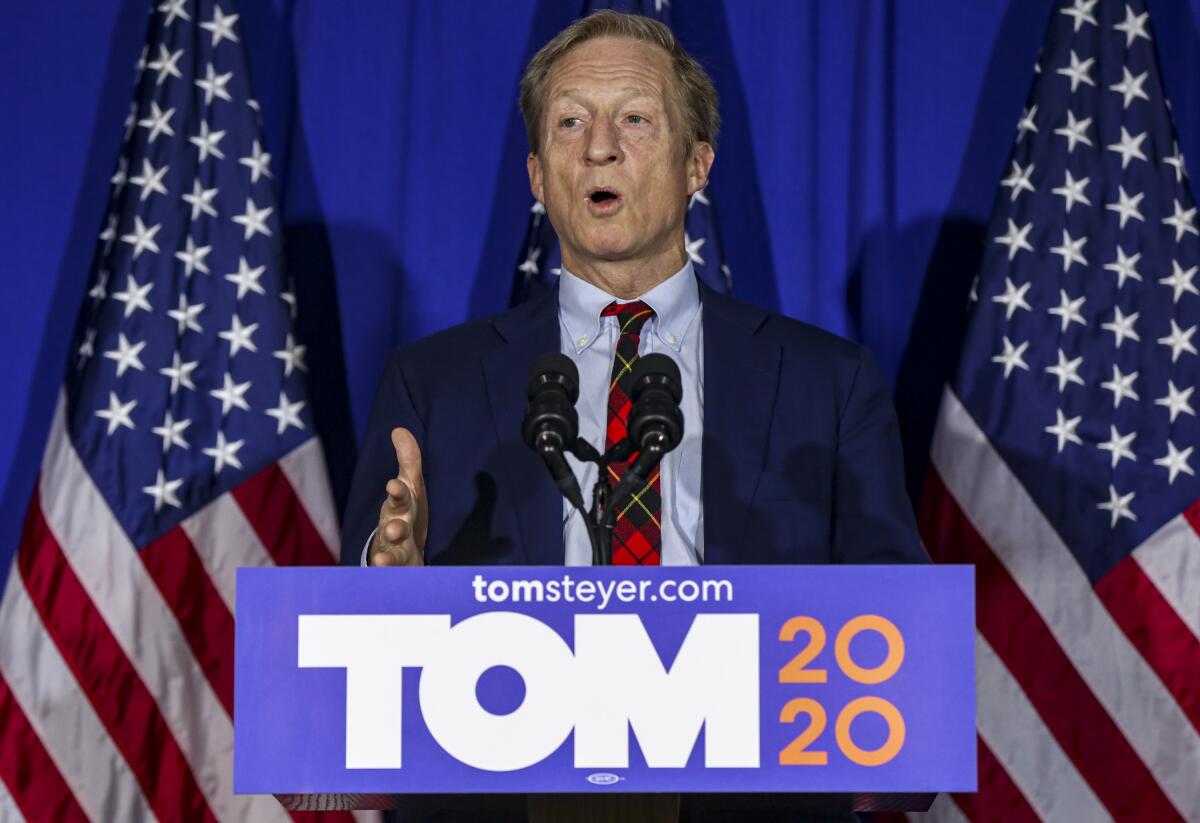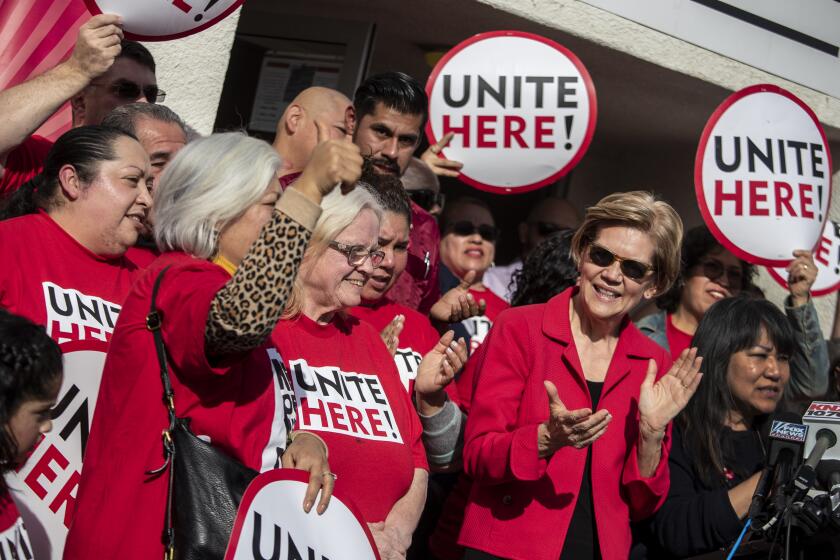Billionaire presidential candidate Tom Steyer rolls out a risky strategy: touting his hedge fund past

IOWA CITY, Iowa — Billionaire Tom Steyer is trying to turn his biggest weaknesses into strengths in the Democratic presidential contest, saying his past experience managing a hedge fund makes him the strongest candidate to take on President Trump.
“If Democrats don’t nominate someone who can go toe-to-toe with him on the economy, Donald Trump will win in 2020,” Steyer told a modest crowd gathered at a co-working space here, adding that none of the front-runners in the race had experience building a business or creating wealth.
“I do. I started my business from scratch, in a one-room office with no windows,” Steyer said, reading off teleprompters. “For nearly three decades, I grew my company into a multibillion-dollar international enterprise.”
Steyer, one of two Californians still in the presidential race, unveiled this new pitch Monday as he tries to shake his standing in national and early-state polls, where he is largely mired in single digits despite spending tens of millions of dollars of his own money on his campaign.
But it’s a challenging argument for him to make, in part because it draws attention to how Steyer made his $1.6-billion fortune — by founding a hedge fund whose investments included massive fossil fuel projects. It also comes at a time when a vocal wing of the Democratic Party has grown increasingly uneasy about the power of Wall Street, corporations and the wealthy.
“I do have concerns with nominating a very rich person to be president, because so many people in this country are not rich and you just worry that there might not be that connection there,” said Christine Muller, a 62-year-old Iowa City homemaker who attended Steyer’s speech. She has not decided whom she will caucus for in February.
Steyer said he was comfortable with voters scrutinizing his track record because once he learned of the consequences of his investments, he divested and then worked hard to fight climate change. Since leaving the hedge fund, Steyer has spent hundreds of millions of dollars supporting Democratic candidates and causes, notably fighting climate change and calling for Trump’s impeachment.
Elizabeth Warren and Bernie Sanders seem to compete for which candidate can most thoroughly denounce billionaires. Not since the Great Depression have candidates so aggressively pilloried the well-to-do.
“When I realized that there were these huge unintended consequences, I divested and I pushed hard for over a decade to deal with climate at a level that no one else in this race has,” Steyer said in an interview, after shedding his blue blazer and red plaid tie and speaking at a senior center in Davenport, Iowa.
Since entering the presidential contest in July, Steyer has drawn the most attention for his personal spending. In the third quarter of the year, Steyer spent $47 million on his campaign, easily outspending all the other candidates in the race and dominating the airwaves, allowing him to qualify for Democratic debates.
But his role as the richest man in the field was supplanted by late-entrant Michael R. Bloomberg, the former New York City mayor with a net worth of $55.5 billion, according to Forbes. Bloomberg has spent $117 million on ads since entering the presidential race on Nov. 24.
“Bloomberg’s spending almost gives Steyer a chance to look like a man of the people. A small and earnest billionaire displaced and oppressed by the even bigger billionaire,” said GOP strategist Rob Stutzman, a former political advisor to billionaire Meg Whitman. “Is there a Hallmark card for such occasions?”
Like Steyer, Bloomberg is a self-made billionaire who created jobs around the world. But Steyer argued that his fellow billionaire was not well positioned to take on Trump and the Republican Party because of his policies, notably his lack of support for a wealth tax.
“We need two things. We need someone who can take them on on the economy and actually talk about prosperity and have the chops to do it, expertise and experience. But it’s also about justice,” Steyer said in the interview, after calling for new taxes on those who make more than $32 million and for taxing paychecks and investment income at the same rate. “I’m saying if Mike Bloomberg doesn’t embrace a wealth tax, I don’t think he’s really all in on economic justice.”
Steyer made the remarks on two-day swing through eastern Iowa.
The December Democratic debate in L.A. is back on track after a labor dispute was settled at Loyola Marymount University. Candidates threatened a boycott.
Stephen Henkhaus, a sophomore at the University of Iowa, was among a few dozen voters who took a picture with Steyer after watching him speak in Iowa City. It was a far cry from the hours-long selfie lines at Massachusetts Sen. Elizabeth Warren’s rallies or large crowds that turn out for Vermont Sen. Bernie Sanders’ events, but Henkhaus appreciated Steyer’s detailed speech and his willingness to take questions.
“I liked that he specifically elaborated on policies like his wealth tax and how he was going to attack student loans,” said the 19-year-old psychology major. Henkhaus saw Sanders when the senator came to Iowa City in October. “It was the ‘End Corporate Greed’ rally, so that was kind of more exciting. It was a larger crowd. But it was less specific.”
Like many of the attendees, Henkhaus was still debating who he would support in the caucuses. But some voters showed up to tell Steyer that although they support other candidates, they appreciated his work for Democratic causes.
Bill Gluba, a former mayor of Davenport, plans to caucus for former Vice President Joe Biden. But the former state legislator came to Steyer’s event to tell the billionaire philanthropist he was a “good man.”
The 77-year-old asked for Steyer’s commitment to continue funding Democratic efforts if he doesn’t win the nomination.
“Of course I will,” Steyer said, adding that his organizations were funded for the entire election cycle. “I’ll be supporting them come hell or high water.”
More to Read
Get the L.A. Times Politics newsletter
Deeply reported insights into legislation, politics and policy from Sacramento, Washington and beyond. In your inbox three times per week.
You may occasionally receive promotional content from the Los Angeles Times.












